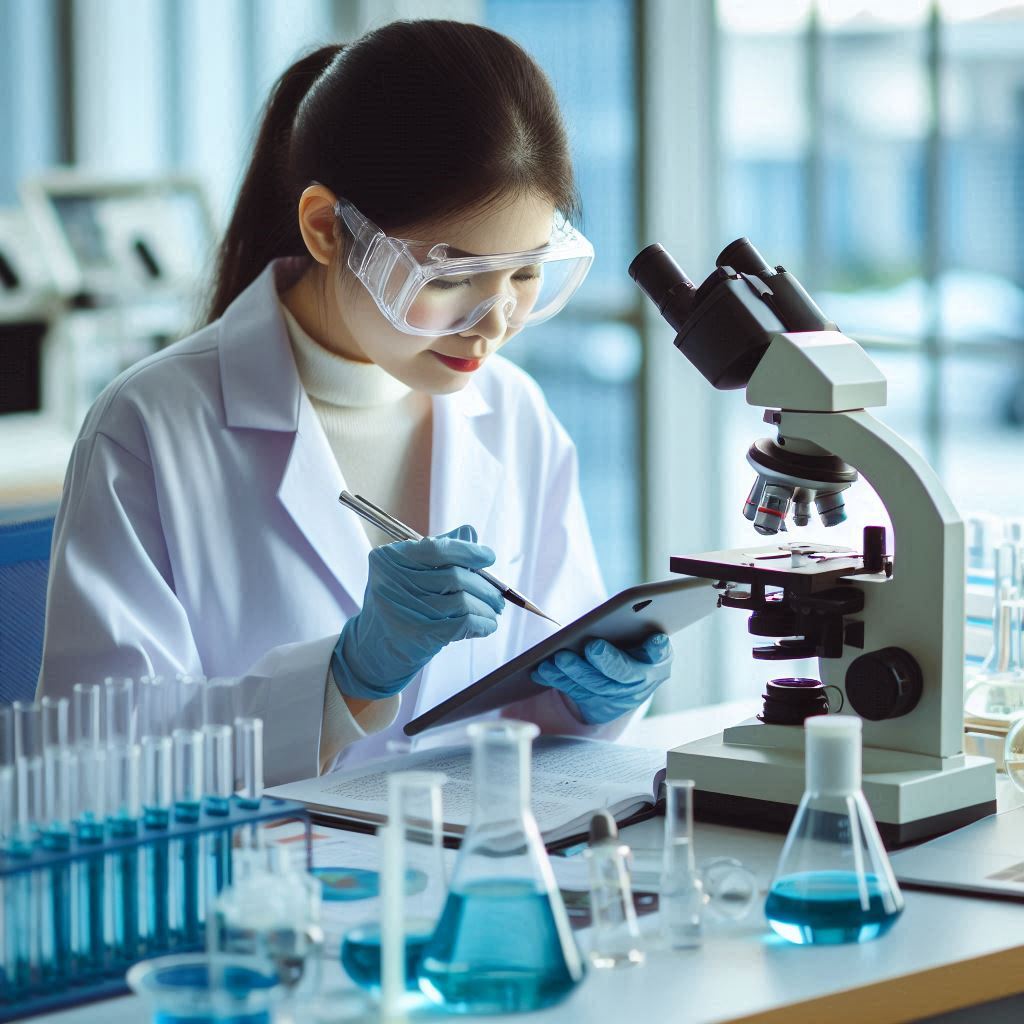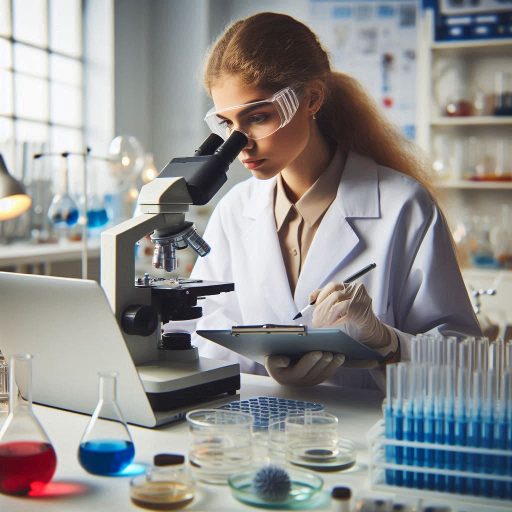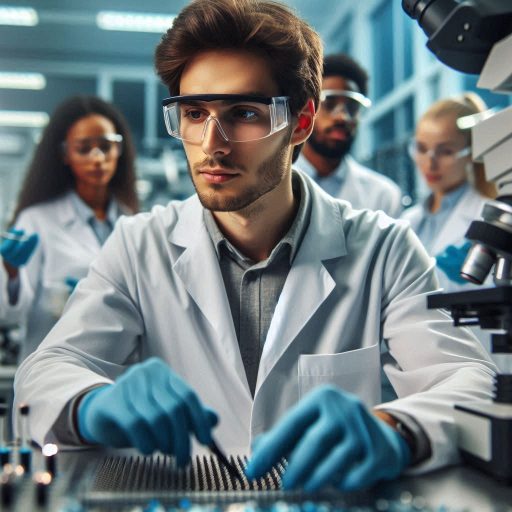Introduction
Microbiologist job interviews offer exciting opportunities for candidates interested in studying microorganisms.
These interviews are crucial for securing positions in laboratories, healthcare settings, and research facilities.
Thorough preparation plays a key role in standing out from other applicants.
Being prepared for common interview questions significantly increases your chances of success.
You will likely face technical questions related to laboratory techniques and safety protocols.
Additionally, behavioral questions often assess your problem-solving skills and ability to work under pressure.
Understanding the responsibilities of a microbiologist before the interview is essential.
This knowledge allows you to effectively connect your skills and experiences to the role.
Tailoring your answers to the specific position demonstrates your suitability for the job.
Moreover, asking insightful questions during the interview shows your interest in the organization.
Engaging with the interviewer makes a strong impression and can create a more dynamic conversation.
In this blog post, we will cover the key aspects of microbiologist job interviews.
We will explore common questions, strategies for answering them, and the importance of preparation.
Confident, well-prepared candidates have a much higher chance of success.
Overview of Microbiologist Job Responsibilities
Microbiologists play a vital role in various fields, including healthcare, agriculture, and environmental science.
Their primary focus is on studying microorganisms such as bacteria, viruses, fungi, and parasites.
Understanding the responsibilities of a microbiologist is crucial for job candidates preparing for interviews.
Familiarity with these duties not only showcases your knowledge but also demonstrates your preparedness for the role.
Brief Overview of the Typical Responsibilities of a Microbiologist
Research and Experimentation
A microbiologist’s primary responsibility involves conducting research to understand microorganisms better.
They design experiments to investigate microbial behavior, growth, and interaction with their environment.
This research often requires careful planning and adherence to scientific protocols.
Accurate data collection and analysis are essential in this process.
Microbiologists must also interpret results and draw conclusions based on their findings.
Laboratory Work
Microbiologists spend a significant amount of time in laboratories.
They conduct tests on samples collected from various sources, such as soil, water, and clinical specimens.
Laboratory work includes isolating and identifying microorganisms using advanced techniques.
They often utilize equipment like microscopes, autoclaves, and culture media.
Maintaining a sterile environment is crucial to prevent contamination during experiments.
Quality Control and Assurance
Quality control and assurance are vital responsibilities for microbiologists.
They ensure that laboratory processes and results meet specific standards.
Microbiologists develop and implement protocols to guarantee accuracy in testing.
They may also be responsible for calibrating and maintaining laboratory instruments.
Adhering to safety regulations is crucial to protect both staff and samples.
Collaboration and Communication
Effective collaboration is essential in a microbiologist’s work.
They often work closely with other scientists, healthcare professionals, and technicians.
Communicating findings to team members and stakeholders is part of their responsibilities.
Microbiologists may also prepare reports and presentations to share research outcomes.
Strong communication skills enhance teamwork and promote a better understanding of scientific results.
Regulatory Compliance
Microbiologists must adhere to various regulatory requirements.
They ensure that their research and laboratory practices comply with industry standards.
Understanding laws and guidelines related to microbiological research is essential.
This knowledge helps microbiologists navigate complex regulatory environments, especially in pharmaceutical and food industries.
Public Health Impact
Many microbiologists contribute to public health initiatives.
They study pathogens and their effects on human health.
By understanding disease transmission, microbiologists help develop prevention and control strategies.
Their work directly impacts community health, emphasizing the importance of their responsibilities.
Importance of Understanding These Responsibilities Before the Interview
Understanding these responsibilities before your interview is crucial.
Interviewers often assess candidates’ knowledge of job functions.
Familiarity with microbiologist duties allows you to answer questions confidently.
This knowledge also helps you ask insightful questions about the role.
Demonstrating a clear understanding of responsibilities shows your commitment and suitability for the position.
It sets a positive tone for the rest of the interview, enhancing your chances of success.
Read: Day in the Life: An Environmental Scientist‘s Typical Day
Common Interview Questions for Microbiologists
Preparing for a microbiologist job interview involves anticipating common questions.
These questions often focus on your technical knowledge, problem-solving abilities, and personal experiences.
Understanding these questions can help you articulate your skills effectively.
This section explains common interview questions for microbiologists and offers tips on how to answer them effectively.
Common Questions That Are Often Asked During Microbiologist Job Interviews
One common question is, “What inspired you to become a microbiologist?” This question aims to assess your passion and commitment to the field.
Interviewers want to know what motivated your career choice.
It‘s an opportunity to share your enthusiasm and background.
Another common inquiry is, “Can you describe your experience with laboratory techniques?” Interviewers often ask about your familiarity with laboratory procedures.
This question allows you to highlight specific techniques, such as culturing, microscopy, or molecular methods.
Be prepared to provide examples from your previous roles.
You may also encounter, “How do you ensure accuracy in your experiments?” Accuracy is crucial in microbiology.
Interviewers want to know your strategies for minimizing errors.
Discuss your attention to detail, adherence to protocols, and the importance of calibration.
Additionally, “Have you ever faced a significant challenge in your research? How did you overcome it?” This question evaluates your problem-solving skills.
Describe a specific challenge and the steps you took to resolve it.
Highlight your ability to adapt and learn from experiences.
Another important question is, “What are the most important safety practices in microbiological research?” Safety is paramount in microbiology labs.
Interviewers want to know your understanding of safety protocols.
Discuss the importance of personal protective equipment (PPE), waste disposal, and sterilization methods.
You might also hear, “How do you stay updated with advancements in microbiology?” This question assesses your commitment to professional development.
Talk about attending conferences, reading journals, or participating in online courses.
Show that you are proactive in staying informed.
Finally, you may be asked, “Can you explain a recent project you worked on? What were your findings?” This question allows you to showcase your research experience.
Choose a relevant project and describe your role, methodology, and results.
Emphasize the impact of your findings on the field.
Tips on How to Effectively Answer These Questions
When answering questions, provide specific examples from your experiences.
Use the STAR method (Situation, Task, Action, Result) to structure your responses.
This approach helps you deliver clear and concise answers.
Express your passion for microbiology in your answers.
Enthusiasm can make a strong impression on interviewers.
Share personal anecdotes or experiences that fueled your interest in the field.
Behavioral questions assess how you’ve handled past situations.
Prepare by reflecting on your experiences and identifying key moments.
Use these moments to illustrate your skills and growth.
Before the interview, research the organization and its projects.
Understanding the company‘s goals allows you to tailor your answers.
Highlight how your skills align with their mission and values.
Lastly, practice answering common interview questions with a friend or mentor.
Rehearsing can boost your confidence and help you articulate your thoughts clearly.
Focus on maintaining a professional tone during your responses.
By preparing for these common interview questions and applying these tips, you can approach your microbiologist job interview with confidence and clarity.
Read: The Impact of Technology on the Chemist Profession in the US
Behavioral Questions
Behavioral questions are a crucial part of microbiologist job interviews.
These questions aim to assess how candidates have handled situations in the past.
Interviewers believe that past behavior is a good indicator of future performance.
Familiarizing yourself with common behavioral questions can help you prepare effectively.
In this section, we will discuss these questions and provide examples of how to structure your answers using the STAR method.
Common Behavioral Questions
One common behavioral question is, ‘Describe a time when you faced a challenging research problem.‘
Interviewers want to understand your problem-solving skills and how you approach obstacles in your work.
Another frequent inquiry is, ‘Can you give an example of a time you worked in a team?‘
This question assesses your teamwork abilities and how you contribute to group efforts in the lab.
You might also encounter the question, ‘Tell me about a time when you made a mistake in the lab.‘
This question evaluates your accountability and ability to learn from errors.
Additionally, ‘How have you handled a disagreement with a colleague?‘ seeks to understand your conflict resolution skills.
Lastly, you may be asked, ‘Describe a project you worked on that required attention to detail.‘
Interviewers want to know how you manage tasks that demand precision and accuracy.
Transform Your Career Today
Unlock a personalized career strategy that drives real results. Get tailored advice and a roadmap designed just for you.
Start NowStructuring Your Answers Using the STAR Method
To answer behavioral questions effectively, use the STAR method, which stands for Situation, Task, Action, and Result.
This structured approach allows you to provide clear and concise responses.
Example 1: Challenging Research Problem
Situation
In my previous role, we faced contamination issues in a bacterial culture experiment.
Task
I needed to identify the source of contamination and implement a solution quickly.
Action
I meticulously reviewed our protocols and found that an autoclave was not functioning correctly.
I worked with the maintenance team to repair it and then reran the experiment.
Result
The culture became contamination-free, and our research timeline was back on track.
The experience taught me the importance of equipment maintenance.
Example 2: Team Collaboration
Situation
While working on a collaborative research project, our team had conflicting ideas about the experimental design.
Task
My role was to facilitate a resolution that incorporated everyone’s input.
Action
I organized a meeting where each team member presented their ideas.
We discussed the pros and cons and combined our best concepts into a revised plan.
Result
The new design improved our experiment‘s effectiveness, leading to a successful publication in a peer-reviewed journal.
Example 3: Learning from Mistakes
Situation: During an experiment, I mistakenly labeled samples, leading to confusion during analysis.
Task: I needed to address the error and ensure it didn‘t affect our results.
Action: I informed my supervisor and retraced my steps to identify the affected samples.
We corrected the analysis and implemented a new labeling system.
Result: We completed the project on time, and my supervisor praised my honesty and quick action in resolving the mistake.
By preparing for behavioral questions using the STAR method, you can present your experiences clearly and effectively.
This structured approach not only highlights your skills but also demonstrates your ability to reflect on past situations and learn from them.
With thoughtful preparation, you will enhance your chances of making a positive impression during your microbiologist job interview.
Read: US Chemistry Conferences and Symposiums to Attend in 2024

Technical Questions
Technical questions are a fundamental part of microbiologist job interviews.
These questions assess your knowledge of microbiology principles, laboratory techniques, and relevant technologies.
Understanding the types of technical questions that may arise can help you prepare effectively.
In this section, we will explore common technical questions and offer advice on how to prepare for and confidently answer them.
Types of Technical Questions
One common type of technical question involves laboratory techniques.
For example, you might be asked, ‘What methods do you use for microbial identification?‘
Interviewers want to evaluate your familiarity with techniques such as polymerase chain reaction (PCR), ELISA, or mass spectrometry.
Another frequent inquiry may focus on your understanding of microbial growth.
Questions like, ‘Can you explain the phases of microbial growth?‘ assess your knowledge of concepts like lag, log, stationary, and death phases.
This understanding is crucial for any microbiologist working in a lab setting.
You may also face questions about safety and regulations.
For instance, ‘What are the key safety practices in a microbiology lab?‘ This question tests your knowledge of laboratory safety protocols and regulatory compliance.
Discussing personal protective equipment (PPE) and proper waste disposal methods will demonstrate your awareness of safety standards.
Furthermore, interviewers may ask about your experience with data analysis and interpretation.
Questions like, ‘How do you analyze experimental data?‘ gauge your ability to use statistical tools and software.
Being familiar with software like SPSS or R can enhance your responses.
Lastly, you might encounter questions about current trends in microbiology.
An example would be, ‘What recent advancements in microbiology do you find most significant?‘ This question tests your ability to stay informed about the field.
Sharing insights on topics like CRISPR technology or microbiome research shows your enthusiasm for ongoing developments.
Preparing for Technical Questions
To prepare for technical questions effectively, begin by reviewing fundamental microbiology concepts.
Familiarize yourself with key terminology, laboratory techniques, and safety regulations.
A solid understanding of these areas will help you answer confidently.
Next, practice articulating your answers.
Consider common technical questions and rehearse your responses.
This practice can help you refine your explanations and make them concise.
Use clear, straightforward language to convey complex concepts.
Engaging in mock interviews can be beneficial.
Partner with a friend or mentor to conduct practice interviews.
Request feedback on your responses to improve your clarity and confidence.
This preparation can simulate the interview experience and alleviate anxiety.
Additionally, stay current with industry advancements.
Read recent publications, journals, and articles related to microbiology.
Understanding contemporary topics will equip you to discuss recent trends confidently during the interview.
Finally, maintain a positive mindset.
Approach technical questions as an opportunity to showcase your knowledge and skills.
Remind yourself that interviewers are interested in your perspective and ability to solve problems.
By preparing for common technical questions and implementing these strategies, you can confidently navigate your microbiologist job interview.
Thorough preparation will enable you to demonstrate your expertise and passion for the field, ultimately increasing your chances of success.
Read: Key Roles and Responsibilities of a Chemist in the US
Questions to Ask the Interviewer
Asking insightful questions during a microbiologist job interview is essential.
This practice helps you gather important information about the role and organization while demonstrating your genuine interest in the position.
In this section, we will discuss various questions you can ask and explain their importance.
Insightful Questions to Consider
Start by asking about the primary responsibilities of the position.
This question provides clarity on daily tasks and expectations.
Understanding the specifics allows you to determine if the role aligns with your skills and interests.
Knowing what to expect can help you visualize yourself in the role.
Inquiring about the laboratory techniques and equipment you will be using is also beneficial.
You can also ask about the team you will be working with, which provides insight into team dynamics and how your role fits within the group.
Understanding your future colleagues can help you assess the work environment and identify potential collaborators.
Another important question is about the biggest challenges currently facing the lab.
Understanding these challenges helps you gauge the lab’s needs and how you can contribute to overcoming them.
Additionally, asking how this role contributes to the lab’s overall goals connects your responsibilities to the organization’s mission and objectives.
This shows that you are interested in the bigger picture and want to add value to the team.
Inquire about opportunities for professional development and training as well.
This demonstrates your commitment to continuous learning and career advancement.
You might also ask how the lab stays current with advancements in microbiology.
This question highlights your interest in innovation and your desire to contribute to cutting-edge research.
You can also ask about the next steps in the interview process.
This question demonstrates your eagerness and keeps you informed about what to expect moving forward.
Finally, asking the interviewer what they enjoy most about working there allows them to share their personal experiences.
This can give you insight into the lab’s culture and values.
Importance of Asking Questions
Asking questions during your interview is crucial for several reasons.
First, it shows that you have researched the organization and are genuinely interested in the role.
This proactive approach helps you stand out among other candidates.
Second, it enables you to gather valuable information that can help you make an informed decision if you receive a job offer.
Understanding the lab’s culture, expectations, and growth opportunities will help you assess whether it aligns with your career goals.
Preparing thoughtful questions to ask during your microbiologist job interview can enhance your candidacy.
By demonstrating your interest and gathering relevant information, you position yourself as a well-rounded and enthusiastic candidate.
Showcase Your Business Today
Reach thousands of readers actively exploring professional services. Publish your business profile and grow your audience now.
Publish NowFind Out More: Climatology Conferences and Events to Attend
Learn More: Seismology Internships: How to Gain Experience
Conclusion
In this blog post, we explored the essential components of preparing for a microbiologist job interview.
Understanding the typical responsibilities of a microbiologist is crucial, as it helps you articulate how your skills align with the position.
Familiarity with your future role enables you to present yourself confidently during the interview.
We examined various types of questions, including technical and behavioral inquiries.
Preparing for technical questions about laboratory techniques and safety protocols showcases your expertise.
Additionally, mastering the STAR method for behavioral questions allows you to convey your problem-solving abilities effectively.
We also discussed the importance of asking insightful questions during the interview.
This demonstrates your genuine interest in the role and helps you gather valuable information about the organization and team dynamics.
Ultimately, thorough preparation and practice are vital for success.
Familiarizing yourself with key concepts, rehearsing answers, and staying informed about industry advancements will enhance your confidence.
By taking these steps, you can significantly increase your chances of securing the microbiologist position you desire.
Embrace the opportunity to showcase your skills and passion for microbiology, and you‘ll be well on your way to success.
[E-Books for Sale]
The Big Book of 500 High-Paying Jobs in America: Unlock Your Earning Potential
$19.99 • 500 High-Paying Jobs • 330 pages
Explore 500 high-paying jobs in America and learn how to boost your career, earn more, and achieve success!
See All 500 High-Paying Jobs of this E-Book
1001 Professions Without a Degree: High-Paying American Jobs You Can Start Now
$19.99 • 1001 Professions Without a Degree • 174 pages
Discover 1001 high-paying jobs without a degree! Unlock career tips, skills, and success strategies for just $19.99!




